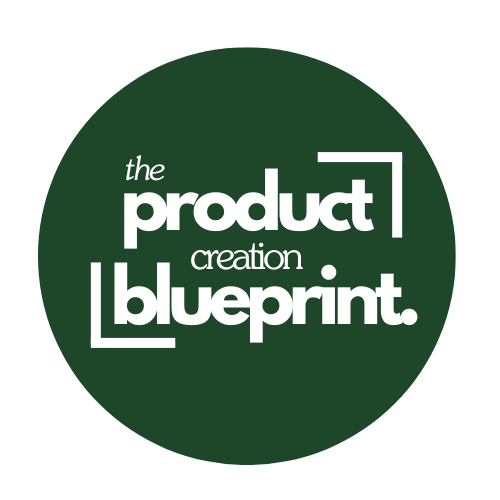Feeling Stuck? Here’s Why You Haven't Started Developing Your Dream Product (And How to Change That)
Nov 14, 2024
We all have ideas. The type that get you excited just thinking about them—the dream product, the business venture you know could make an impact, the thing that lights you up. Yet, many of us never take that first step. Instead, we stay in a cycle of overthinking and self-doubt, wondering why we’re stuck, why we can’t just start.
So, what’s really going on here? Let’s dive into some common reasons why so many people hesitate to take the leap into product development and, most importantly, how you can push past those barriers to finally make it happen.
1. The Perfectionism Trap: “It’s Not Good Enough Yet”
One of the biggest reasons people feel stuck is the nagging belief that everything has to be perfect before they can start. We convince ourselves that we need the right amount of money, connections, skills, and even “perfect timing.” We get so wrapped up in imagining all the ways it could fail that we don’t even give ourselves the chance to try.
But here’s a reality check: perfectionism is just another form of procrastination. The truth is, no product is perfect from day one. Every successful product you see today started as a rough idea, full of flaws and improvements waiting to happen.
Tip: Start by embracing imperfection. Break down your big vision into small, actionable steps and focus on making progress rather than achieving perfection. One small step forward is infinitely better than waiting for an ideal that may never come.
2. Fear of Failure (Or Success)
It may sound strange, but fear of success can be just as paralyzing as fear of failure. Many people subconsciously worry about what success could mean for their lives. “What if I can’t handle it?” “What if I succeed but lose my free time or face more pressure?” Alternatively, the fear of failure, and all the “what ifs” that come with it, can be equally powerful.
Both fears boil down to one thing: a lack of trust in yourself. If we truly believed in our ability to handle failure and success, these fears wouldn’t hold us back.
Tip: Work on building trust in yourself. Remind yourself that failure isn’t fatal; it’s feedback. And success doesn’t have to mean losing control—it can mean gaining it. Reflect on times you handled challenges in the past to remind yourself that you can navigate the unknown.
3. Imposter Syndrome: “Who Am I to Do This?”
This is a big one. Imposter syndrome shows up as thoughts like, “Who am I to create this product?” or “I’m not an expert; there are people out there who know way more than me.” This kind of thinking is so common that even top industry experts admit to experiencing it.
Here’s the truth: the fact that you care enough to be questioning your ability probably means you’re the right person for the job. Your unique perspective is what makes your product valuable. Nobody else can do it quite like you.
Tip: Acknowledge your experience and passions. Write down a list of reasons why your idea excites you and what unique perspective you bring to the table. You’ll realize that you’re not an imposter—you’re simply someone with a fresh perspective.
4. The Myth of “Ready”
So many people feel stuck because they’re waiting to feel “ready.” But waiting to feel ready is like waiting for a perfect moment to start anything—you’ll likely be waiting forever.
Feeling ready doesn’t happen before you begin. In fact, readiness usually kicks in after you’ve already started, as you gain confidence from taking action. Realizing that the feeling of readiness isn’t a prerequisite but a byproduct of taking steps can help you move forward.
Tip: Embrace the idea that starting is what makes you ready. Set a launch date or a milestone, even if it feels uncomfortable. Challenge yourself to take one concrete action today—whether it’s jotting down a rough outline of your product or brainstorming ideas. This step will give you the momentum you need to start feeling ready.
5. Lack of a Clear Vision or Plan
Another reason people hesitate is that they feel overwhelmed and unsure where to start. Without a roadmap, the idea of creating a product feels daunting and unachievable. We might start to believe it’s not feasible or that we’re “just not cut out for it.”
Tip: Outline a simple, clear plan. Start by defining your goal and breaking it down into manageable steps. Set small, achievable milestones, like conducting initial research, outlining a rough product concept, or even creating a vision board. A clear roadmap helps remove the feeling of “impossible,” replacing it with tangible next steps.
6. Limiting Beliefs: “I Don’t Deserve This”
Deep down, we all have beliefs about what we do or don’t deserve. It’s easy to let self-doubt slip in and convince us that creating a successful product isn’t for people like us—that success is reserved for others with more resources or experience.
Recognize that these limiting beliefs are simply thoughts, not truths. You don’t need to have everything figured out from the start, and you absolutely don’t need permission from anyone to pursue your dream.
Tip: Challenge your limiting beliefs by identifying them clearly and replacing them with positive affirmations. For instance, if you think, “I’m not cut out for this,” try, “I am capable of learning, growing, and making my vision a reality.”
Conclusion: Make the First Move
The process of starting your dream product journey is less about knowing everything from the start and more about having the courage to begin. Every successful entrepreneur or creator once stood where you are, facing self-doubt, fear of failure, and limiting beliefs.
The key? They didn’t let those feelings dictate their actions. They started anyway, imperfectly, and learned as they went.
So, if you’re feeling stuck, remember that you’re not alone—and that getting started doesn’t require an absence of doubt, just a willingness to take one step at a time. Embrace the uncertainty, trust your vision, and remind yourself that your dream product is worth it. And you are too.

